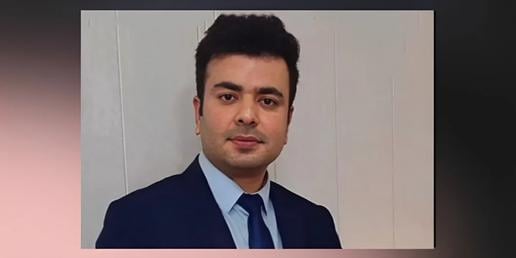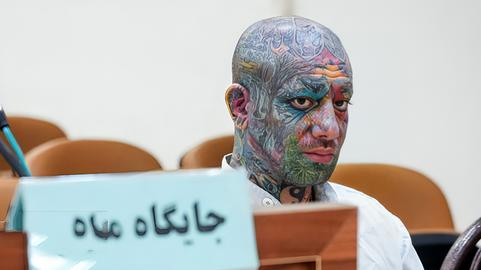Two months have passed since Iranian authorities arrested journalist Saba Azarpeik, and little is still known about her whereabouts or the formal charges against her.
Azarpeik, who worked for numerous publications including the daily Etemad, is known for her hard-hitting interviews with Islamic Republic officials and her vocal criticism of the state’s treatment of journalists. Her family has received no information about where she is being held or when Azarpeik might face trial.
“We know that two of Saba’s vertebra have been dislocated and she is suffering from a high fever,” wrote her mother Akram Mohammadi on her Facebook page, directly addressing Iranian judicial authorities. “She has been in solitary confinement for the past two months with no contact and has not been questioned for a month.” She implored the judicial inspector to submit his report so that Saba might be released.
Mohammadi has refused to speak to the media, and told IranWire recently that she would prefer to pursue Saba’s release independently, as not to endanger her daughter further by speaking to the press.
Azarpeik was arrested on May 28 but has been allowed to contact her family only once. Authorities reportedly promised her mother two weeks ago that she would be released on bail, but when Mohammadi arrived at court to find out the amount, she was told that Azarpeik had been taken to Branch 28 of the Revolutionary Court to stand trial before Judge Mohammad Moghisei, infamous for his harsh sentences against human rights activists. She rushed to the courthouse but authorities had put Azarpeik back in jail.
Azarpeik’s next court appearance is scheduled for Tuesday, July 30, but a lawyer will not represent her. According to accounts of those who have seen her during detention, she has lost a great deal of weight and is in a weak emotional state.
Authorities Deny Lawyer Access
The lawyer Alizadeh Tabatabaei, who is representing Azarpeik, tells IranWire that she is facing two ongoing cases, one of which is before the Revolutionary Court and the second with the prosecutor’s office, with the latter still pending indictment.
Azarpeik was arrested once before in January of 2013, along with a group of journalists who were accused of being in contact with foreign media, including the BBC, and was released after a month in prison.
Authorities have not permitted Tabatabaei to visit his client or to talk with her on the phone. He says that judicial authorities have issued and renewed a one-month detention order for Azarpeik, and that he is seeking a second renewal, in order to secure her release on bail before the trial.
Even Tabatabaei has not been able to learn where Azarpeik is being held, or which security force is responsible for her arrest. When asked if it is lawful to prevent her lawyer from visiting her, he pauses for a few seconds and replies, “the only thing I can say is that we are doing our utmost to make sure that she gets a fair trial.”
Officials Evade Questions
Reporters have sought to question officials on the circumstances of her arrest, but they have dodged the issue. Only the Tehran MP Ali Motahari, a conservative but a vocal critic of the regime’s handling of the opposition, was willing to single out the judiciary for being responsible for the arrest. He refuses to speak to IranWire about the case, saying he will only grant interviews to domestic media.
Two weeks after Azarpeik’s arrest Attorney-General Gholam-Hossein Mohseni-Ejei also evaded a reporter’s questions about her detention, saying, “there is no defendant whose family does not know where he or she is detained.” When pressed, he said, “the case is still at the prosecutor’s office and as no indictment has been issued I cannot talk about it. But if her family has no idea where she is being detained I will pursue the matter.”
Mohammadi, Azarpeik’s mother, followed up his comments on Facebook. “Mr. Ejei, either you are uninformed or you have been lied to. Up to now as much as I have tried to find out where Saba is—and I have asked the interrogator and the first deputy prosecutor—I have been told that ‘we are under no obligation to give you this information.’ How can you be so certain that you tell reporters it is unnecessary for a family to know where their loved one is being detained? Please be more certain before you answer the Iranian people, so that behind your back they will not say that you’re lying.”
President Hassan Rouhani also faced reporters’ questions regarding Azarpeik and responded without using her name. “About the person whom you named, we will do our utmost to pursue the matter and solve the problem.” Twenty days have passed since the president vowed to “solve the problem” and her family has yet to receive news of her circumstances.
Hard-hitting interviews
At the time of her arrest, Azarpeik worked as a parliamentary correspondent for the daily Etemad. The newspaper’s managing editor, Elias Hazrati, would not agree to a phone interview. “Even with domestic media I only give interviews in writing,” he tells IranWire. He has only one sentence to say about his reporter’s detention: “We are doing our best to pursue the situation.”
Etemad is reportedly prohibited from publishing news about Azarpiek, but when the newspaper published a special edition to commemorate its 3000th issue, Hazrati wrote a piece reminding readers of Azarpeik’s interview with Ali Akbar Javanfekr, the managing-director of the state-run IRNA news agency, who in 2011 was sentenced to one year in prison for "publishing materials contrary to Islamic norms."
That interview led to Etemad’s suspension by the authorities. “Wherever Azarpeik is, I hope that God is with her and that she will soon be released,” Hazrati wrote. “Not only can she not be blamed for anything, but her interview was powerful and elegant and she deserves to be thanked for it.”
Azarpeik conducted controversial, challenging interviews with authorities right up to her arrest. On May 20, following the anti-Rouhani rally known as "We Are Anxious", Azarpeik published an article in which she interviewed Mohammad Sadegh Kooshky, a University of Tehran professor supportive of the movement behind the rally. The interview angered Kooshky and he responded insultingly to Azarpeik during their conversation, an exchange she then reproduced in her piece. Kooshky, in addition to his academic work, also works with the Ministry of Intelligence as a media expert.
Hazrati took responsibility for publishing the interview. “What is printed is no longer the responsibility of Azarpeik,” he wrote. “’I am the one who must accept the blame if the law has been broken. I have never reprimanded a reporter or an editor for what has been printed in the newspaper. That responsibility is mine only.”
But Hazrati’s willingness to take editorial blame for his journalists’ work holds little weight with the judicial authorities, who have arrested numerous reporters in recent years for work that carries their own byline.





















comments